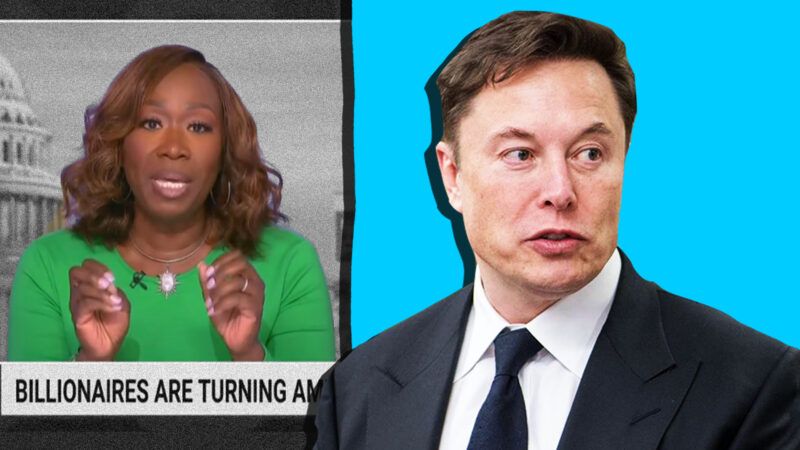MSNBC's Joy Reid Claims Elon Musk 'Misses' Apartheid-Era South Africa
If Musk was so fond for South Africa's segregationist policies, why did he refuse military conscription and jump ship to Canada as a teen?

On Tuesday night, MSNBC anchor Joy Reid implied that SpaceX/Tesla founder Elon Musk, who's in the process of purchasing Twitter, wants to own the social media site to restore the white supremacy of Apartheid-era South Africa.
In Reid's telling, right-wingers on Twitter have "been described as being on the outside of the culture looking in through the glass. But they don't just want to come in. They want to come in and be able to punch people in the face and walk around and laugh about it and then not have anyone to stop them."
"The enjoyment they get out of being in this 'town square' is being able to harass people, being able to attack people…Elon Musk, I guess he misses the old South Africa in the '80s, I guess he wants that back," offered Reid.
Reid wasn't the only one hinting, or outright declaring, that Musk has racist motivations. She was joined by discredited Black Lives Matter activist Shaun King, who said Musk's actions were "about white power" and that he "was raised in Apartheid by a white nationalist."
https://twitter.com/shaunking/status/1518576839777734657?s=20&t=7p0IuTozsWQ0BjdEm_qt-Q
This is false on multiple counts. Musk was born in Pretoria, South Africa, in 1971. His parents divorced when he was a child, and Musk lived with his father Errol, an engineer who amassed a large fortune, for several years. Musk moved to Canada in 1988 when he was 17. He and his father became estranged later on, though Musk said in 2019 that Errol contributed "10% of a ~$200k angel funding round" to Zip2, one of Musk's early business ventures.*
The oft-repeated claim that Elon Musk is a racist or an Apartheid supporter likely originates from the Errol's claim that he owned a Zambian emerald mine in the 1980s. Many people have since used Errol's claim to argue that the family must have profited from Apartheid, with some detractors alleging that this fortune was then funneled to Elon and used by him at the start of his career.
But this story doesn't hold up. Errol, who has been embroiled in salacious scandals and whose own family members say is unreliable, claims he owned a stake in an emerald mine in Zambia in the '80s, after the Musk parents divorced. The mine was in Zambia, not South Africa, and we have no evidence that whatever profits the mine produced actually was given to Elon in the late '90s as angel funding. Nor do we have any evidence that Musk was fond of South Africa's terrible segregationist policies, which all white South Africans benefited from, regardless of whether they supported them. Toward the end of the '80s, Elon jumped ship to Canada in order to avoid mandatory military service in South Africa. "Spending two years suppressing black people didn't seem like a great use of time," he said in an interview later*. He received a university scholarship and worked various menial jobs at farms and lumber mills—odd behavior for someone who was purportedly privy to his father's fortune.
Elsewhere, writers like Elie Mystal, The Nation's justice correspondent, have dubiously suggested that Musk has a "history of racial animus" that could threaten the safety of black journalists, sources, and activists.
To me, the principle danger in the new Twitter overlord is that an impulsive, bad faith actor with a history of racial animus now owns messages to and from Black people that were intended to be private or quasi private.
— Elie Mystal (@ElieNYC) April 26, 2022
But even if your whiteness protects you, it won't protect me. Or my sources. I have to assume that anything I DM or is DM'd to me could now be "leaked" or "hacked" or "whoopsie'd" to Stone or Breitbart or Newsmax or Mediaite or any white wing actor or organization looking for it.
— Elie Mystal (@ElieNYC) April 26, 2022
"History of racial animus" is a weird way to describe a draft dodger who specifically left his native country at least in part because he did not want to take part in the government's efforts to oppress black South Africans.
Very few of these talking heads have even mentioned that black employees at Tesla are suing the company on the grounds that Tesla was filled with "rampant racism" that went "unchecked for years." That omission is pretty striking—there's a brand new lawsuit they could reference, as opposed to conjecture based on wild claims of ancient grandeur by Musk's estranged father.
Perhaps that's because pegging their case against Musk to allegations of bad labor practices at a company with 70,000 employees isn't quite as eye-catching as claiming that a white South African immigrant born under Apartheid is hatching plans to further or worsen racial discrimination. Discussing conditions would require separating Musk's personal animus (or lack thereof) from his awareness of factory culture as CEO of Tesla.
The media class, as evidenced by the above clips and tweets, seems more preoccupied with the idea that Musk is a racist who wants to empower whites and subjugate minorities. These are incredibly serious allegations for which they offer no proof, recycling false or suspect claims with no additional reporting that might corroborate stories about Musk's family, fortune, or beliefs.
All these attempts to paint Musk as the new capo of the coming race war say more about Musk's media critics than they do about the man himself. Journalists at major outlets and networks, who ought to have some fidelity to truth, are more interested in tarring perceived ideological enemies than soberly critiquing what their political adversaries have gotten wrong.
*Correction: This article has been updated to reflect the amount of money Errol Musk invested in Zip2, and to clarify a quote Elon Musk gave about his reasons for avoiding conscription in South Africa.


Show Comments (74)